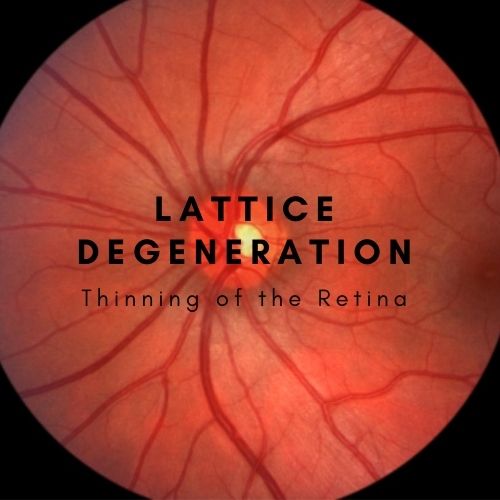What is Lattice Degeneration?


Lattice degeneration is a retinal condition in which the retinal tissue has abnormally thin patches that may increase the chance of retinal detachment.
The condition is relatively common and is present in about 10% of the population and is typically found in both eyes. It is more common in people with myopia (nearsightedness). The incidence of lattice degeneration does not follow a definitive inheritance pattern, but it does sometimes occur in families.
The thin patches are on the edges of the retina and have fine white lines arranged in a lattice appearance like the crossed strips of wood that form a lattice fence. The white lines are caused by blood vessel changes.
Lattice degeneration does not usually cause symptoms and most people with the condition will never experience symptoms.
The condition can make you slightly more likely to have a retinal detachment. The risk is small. About 30% of spontaneous retinal detachments occur in eyes with lattice degeneration. However, retinal detachment itself is very rare, occurring in 1 in 10,000. Which means that if you were diagnosed with lattice degeneration, the odds are low that the lattice degeneration will lead to a detached retina.
How is Lattice Degeneration Treated?
Most patients with lattice degeneration never need any treatment other than monitoring their condition with regular dilated eye exams. Having lattice degeneration is not a threat to vision.
Any retinal holes from lattice degeneration are treated and managed the same as a retinal tear, but not all retinal holes from lattice degeneration require treatment. Many have no symptoms and therefore don’t require treatment, only monitoring. If there are active symptoms, such as accompanying subretinal fluid, then a laser may be used to seal the hole or tear.
Helpful/Preventative Action
The most important action you can take if you are diagnosed with lattice degeneration is to have regular dilated eye exams and know the symptoms of a retinal tear or detachment so you can seek immediate treatment.
Symptoms of Retinal Tears and Detachments
- Sudden onset of black spots or “floaters” in the eye
- Flashes of light
- A shadow over your side vision
- Sudden appearance of a dark curtain that covers part of your field of view
